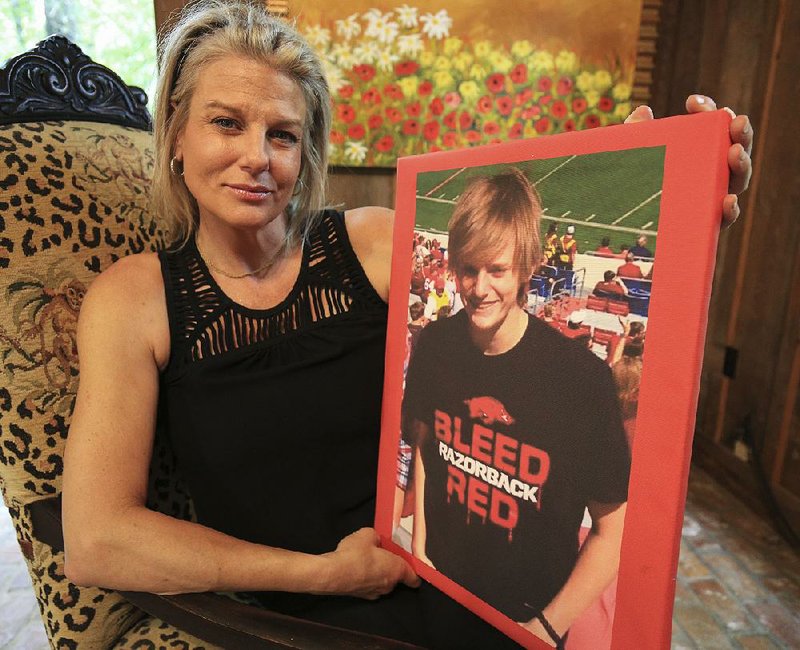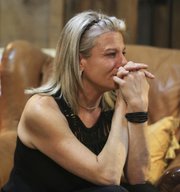If Piper Partridge had only remembered her purse that day in October, her 17-year-old son would have been at Arkansas Children’s Hospital and not in the woods with a gun.
Instead, Keagan Schweikle’s life came to an end on the banks of the Saline River after two bullets from a Benton police officer pierced his body.
Partridge said she feared her son was becoming suicidal and needed help, so she planned to take him to the hospital after finding out he had been suspended for having prescription cough medicine at school.
But while in the car, Partridge said she realized she left her purse and insurance card at their home in Benton, and that they would need to retrieve it before heading to Little Rock.
“Had I had my purse, we wouldn’t be sitting here and I’d still have my son,” Partridge said in an interview earlier this year.
Now, Schweikle’s family is suing the city of Benton, Police Chief Kirk Lane and officer Kyle Ellison, who fired the fatal shots at Schweikle after responding to Partridge’s 911 call that her son had a gun.
The suit, filed in federal court last week, argues that the department “needlessly and senselessly” took Schweikle’s life and then officers later that day “disparaged” his reputation in an attempt to “avoid responsibility for their actions.”
In a written police statement, Ellison said he fired three shots at Schweikle, who had a put a gun to his own head. According to the statement, Ellison fired after Schweikle removed the gun from his own head and pointed it in Ellison’s direction. The lawsuit argues that Schweikle did not point the gun at officers and was simply following Ellison’s orders to drop the gun by moving it from his head.
“Despite doing exactly as he was commanded by Ellison, he was shot dead,” the lawsuit reads.
Brent Houston, Benton city attorney, declined comment on the lawsuit Sunday.
The lawsuit also takes issue with the Benton Police Department’s investigation of the fatal shooting. It asserts that the department failed to investigate Ellison by not inquiring into his history or mental state that day. Instead, the lawsuit argues that the department spent most of its time and energy developing information on Schweikle.
According to the lawsuit, the department waited 10 days to record statements from Ellison and three other officers who witnessed the shooting. Ellison was interviewed for nine minutes. The first interview with Partridge occurred the next day, and lasted about 90 minutes, according to the lawsuit.
Partridge said her son was a fun-loving teenager who had found a fit at Harmony Grove High School after they moved to Arkansas from Florida in August 2015.
She said he loved the smalltown feel of his new high school and played baseball on his school’s junior varsity team his sophomore year. He loved going to Razorback games, playing putt putt and riding go-carts.
But Partridge said her son had struggled with depression, which led to his drug use. She had taken him to Rivendell Behavioral Health Services of Arkansas for an assessment, but she said they did not deal with substance abuse. And then in August, two months before Schweikle was killed, his girlfriend went back to college and his depression accelerated.
On Oct. 17, the day he was killed, Schweikle showed up late to his first period class at Harmony Grove High School.
His teacher knew something was wrong by the look on his face, she later told investigators. She tried to get him to do classwork, but Schweikle would mumble, unable to make a complete sentence.
Schweikle fell asleep twice during the class, and the teacher later told authorities that she thought he was high.
After first period, a coach pulled Schweikle aside to talk. But minutes into the next class, the high school junior was found asleep again and was sent to the school office.
Schweikle was found with prescription cough medicine, according to the lawsuit, and was suspended for 10 days.
In the principal’s office, Partridge said she called two drug treatment facilities to take Schweikle for an immediate intervention, but neither could take him that day.
“I felt so incredibly helpless,” he said. Instead, she decided to take him to Arkansas Children’s Hospital for help.
When they got in the car, she said, Schweikle broke down, sobbing uncontrollably.
“He said ‘Look at what I’ve done, I’ve screwed my whole life up,’” Partridge said, recalling the scene.
She said Schweikle said he had disappointed his grandfather and would not be able to play baseball anymore. He even said he would not be able to go to college.
“I was staying calm, but in a complete state of panic,” she said.
Once they got home, he stood in her doorway, still weeping, she said.
“And he said ‘I’ve just screwed it all up. There’s no help for me,’” Partridge recalled. “I said ‘There is help for you.’”
Partridge said she was putting on her shoes when Schweikle called out that he was going for a walk.
Partridge caught up with him and saw him sitting on a bench near a wooded area in the neighborhood, according to the lawsuit. Schweikle then pulled a 9mm pistol out of his pocket and put it to his head, according to the lawsuit.
While on the phone with a 911 operator, she pleaded with him to hand over the gun but he went into the woods.
Police arrived on scene and began to search for Schweikle. Citing a recorded interview with Ellison, the lawsuit said the Benton officer found Schweikle on the riverbank and confronted him.
According to the lawsuit, Schweikle raised the gun to his temple and Ellison commanded him to drop the firearm multiple times.
Partridge says there was not a domestic disturbance, and there was never an argument with her son, as she was trying to keep him calm and get him to the hospital.
“Keagan simply began to move the gun away from his head when Ellison fired three quick shots at Keagan’s chest,” according to the lawsuit.
Two bullets hit the teenager and he was dead in less than a minute, according to the lawsuit.
“There needs to be change, and I have to be his voice,” Partridge said. “Listen, at any given moment, any parent can be in my shoes. They don’t want to walk in them.”

